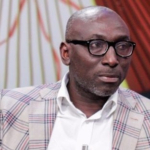
Director of Conflict Resolution for the National Democratic Congress (NDC), Abraham Amaliba, has dismissed reports suggesting that NDC lawyers were cutting deals for former appointees of the New Patriotic Party (NPP) facing corruption-related charges.
Speaking on Joy News’ PM Express on October 22, Mr. Amaliba said the General Secretary, Fifi Kwetey’s comments at the Kumasi meeting of NDC lawyers were misunderstood. He stressed that no NDC lawyer was involved in any backroom deal, insisting that lawyers who appear in such cases are only doing their professional duty.
“The General Secretary’s comments at the Kumasi meeting of the NDC lawyers was not to say that there were NDC lawyers cutting deals,” he said. “What I’m aware is that, as a lawyer, anybody can come for your services, and you may choose to represent the person or not.”
He explained that when an NDC lawyer takes up the case of a former NPP appointee, it should not automatically be seen as a betrayal of party loyalty or an attempt to negotiate political favors.
“So suppose we find an NDC lawyer in one of these cases, and he’s doing his job as a lawyer,” he said. “You may think that, yes, he’s there to cut deals, but he’s there working as a lawyer simplicita, and every lawyer will do that to ensure that his client gets his freedom.”
Mr. Amaliba, who also serves as the Acting Director-General of the National Road Safety Authority, however, cautioned that NDC lawyers who hold positions in government must be mindful of public perception when accepting such cases.
“However, if you are a member of this government and you are a lawyer, and you know that the government has waged war against former appointees, you may have to think twice before taking up those cases, because it may be construed like the way the General Secretary misconstrue the conduct of those lawyers to mean that you are cutting them,” he said.
He noted that the issue was discussed extensively among NDC lawyers, and the general view was that members of the party should avoid taking on such politically sensitive cases even if they are legally permissible.
“So I think on our platform, that argument came up, and I think overwhelmingly, we were of the view that many lawyers belonging to the NDC avoid taking up those cases,” he said. “You would have been doing your work as a lawyer, but the implication will be what we are hearing from the General Secretary. So I think it was good for him to spend time, to make those comments, for people to know that he wasn’t involved in it.”
When asked if he personally would take up such a case if approached by any of the accused former NPP officials, Mr. Amaliba said he would have to weigh his options carefully.
“That’s what I’m saying,” he replied. “I will have to weigh the repercussions as a politician, and as a lawyer. You may say that is where you get your daily bread so why would you turn it down? But again, you have to also think about the larger interest of the party.”
He admitted that such a situation presents a difficult balance between professional ethics and political sensitivity.
“And so it’s a dicey thing. It’s a chicken and egg situation,” he said. “But I am trying to just let you understand how the General Secretary came to that conclusion, because lawyers will do their work, not referencing themselves as NDC lawyers, but again, the General Secretary will see this person as an industry lawyer. So why are you involved in this case? So I’m just trying to let you understand how this might have come about.”